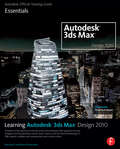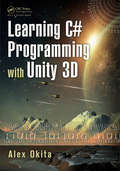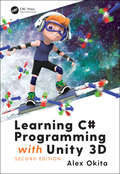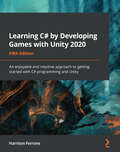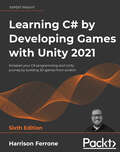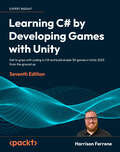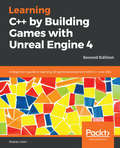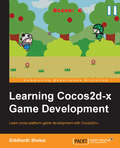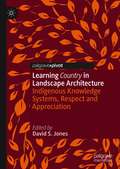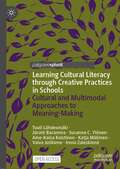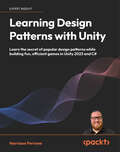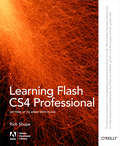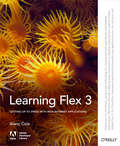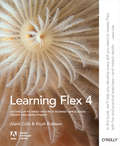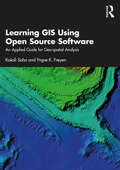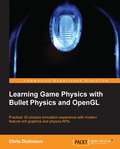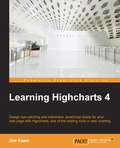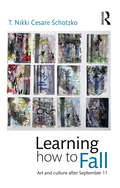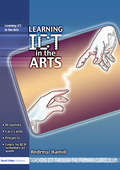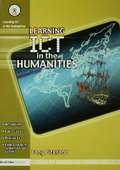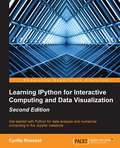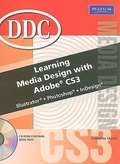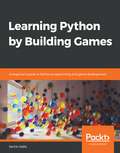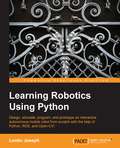- Table View
- List View
Learning Autodesk 3ds Max Design 2010 Essentials: The Official Autodesk 3ds Max Reference
by AutodeskLearning Autodesk 3ds Max XXXX Essentials is a superb end-to-end reference that provides users with complete info on all of the features and options available in the latest version of 3ds Max, so that users can learn how to use 3ds Max confidently in a production environment. Each chapter offers a series of lessons - which introduce the functional areas of Max and go over all associated features (with examples), and then a lab (which demonstrates a practical application of the lesson). Together, all of the lessons deliver and sound and complete approach to revealing the functions, features, and principles of 3ds Max XXXX. New Bonus section on MaxScript covering techniques for automating repetitive tasks and customizing 3ds Max to make you more productive.The DVD includes: Project Scene & support files, Free models & texture maps from Turbo Squid, NEW!! HIGH VALUE: Autodesk product Sketchbook Pro (for character development) valued at $199.99 US.
Learning C# Programming with Unity 3D
by Alex OkitaDesigned to give you enough familiarity in a programming language to be immediately productive, Learning C# Programming with Unity 3D provides the basics of programming and brings you quickly up to speed. Organized into easy-to-follow lessons, the book covers how C# is used to make a game in Unity3D. After reading this book, you will be armed with
Learning C# Programming with Unity 3D, second edition
by Alex OkitaLearning C# Programming with Unity 3D, Second Edition is for the novice game programmer without any prior programming experience. Readers will learn how C# is used to make a game in Unity 3D. Many example projects provide working code to learn from and experiment with. As C# evolves, Unity 3D evolves along with it. Many new features and aspects of C# are included and explained. Common programming tasks are taught by way of making working game mechanics. The reader will understand how to read and apply C# in Unity 3D and apply that knowledge to other development environments that use C#. New to this edition: includes latest C# language features and useful tools included with the .NET library like LINQ, Local Functions Tuples, and more! Key Features Provides a starting point for the first-time programmer C# Code examples are simple short and clear Learn the very basics on up to interesting tricks which C# offers
Learning C# by Developing Games with Unity 2020: An enjoyable and intuitive approach to getting started with C# programming and Unity, 5th Edition
by Harrison FerronePublisher's note: This edition from 2020 is outdated and does not make use of the most recent Unity and C# features. A new sixth edition, updated for Unity 2021 and including new advanced C# topics, such as reading, writing, and serializing data, has now been published.Key FeaturesUnderstand C# programming basics, terminology, and coding best practicesPut your knowledge of C# concepts into practice by building a fun and playable gameCome away with a clear direction for taking your C# programming and Unity game development skills to the next levelBook DescriptionOver the years, the Learning C# by Developing Games with Unity series has established itself as a popular choice for getting up to speed with C#, a powerful and versatile programming language that can be applied in a wide array of application areas. This book presents a clear path for learning C# programming from the ground up without complex jargon or unclear programming logic, all while building a simple game with Unity.This fifth edition has been updated to introduce modern C# features with the latest version of the Unity game engine, and a new chapter has been added on intermediate collection types. Starting with the basics of software programming and the C# language, you'll learn the core concepts of programming in C#, including variables, classes, and object-oriented programming. Once you've got to grips with C# programming, you'll enter the world of Unity game development and discover how you can create C# scripts for simple game mechanics. Throughout the book, you'll gain hands-on experience with programming best practices to help you take your Unity and C# skills to the next level.By the end of this book, you'll be able to leverage the C# language to build your own real-world Unity game development projects.What you will learnDiscover easy-to-follow steps and examples for learning C# programming fundamentalsGet to grips with creating and implementing scripts in UnityCreate basic game mechanics such as player controllers and shooting projectiles using C#Understand the concepts of interfaces and abstract classesLeverage the power of the latest C# features to solve complex programming problemsBecome familiar with stacks, queues, exceptions, error handling, and other core C# conceptsExplore the basics of artificial intelligence (AI) for games and implement them to control enemy behaviorWho this book is forIf you're a developer, programmer, hobbyist, or anyone who wants to get started with C# programming in a fun and engaging manner, this book is for you. Prior experience in programming or Unity is not required.
Learning C# by Developing Games with Unity 2021: Kickstart your C# programming and Unity journey by building 3D games from scratch, 6th Edition
by Harrison FerroneLearn C# programming from scratch using Unity as a fun and accessible entry point with this updated edition of the bestselling series. Includes invitation to join the online Unity Game Development community to read the book alongside peers, Unity developers/C# programmers and Harrison Ferrone.Purchase of the print or Kindle book includes a free eBook in the PDF format.Key FeaturesLearn C# programming basics, terminology, and coding best practicesBecome confident with Unity fundamentals and features in line with Unity 2021Apply your C# knowledge in practice and build a working first-person shooter game prototype in UnityBook DescriptionThe Learning C# by Developing Games with Unity series has established itself as a popular choice for getting up to speed with C#, a powerful and versatile programming language with a wide array of applications in various domains. This bestselling franchise presents a clear path for learning C# programming from the ground up through the world of Unity game development. This sixth edition has been updated to introduce modern C# features with Unity 2021. A new chapter has also been added that covers reading and writing binary data from files, which will help you become proficient in handling errors and asynchronous operations. The book acquaints you with the core concepts of programming in C#, including variables, classes, and object-oriented programming. You will explore the fundamentals of Unity game development, including game design, lighting basics, player movement, camera controls, and collisions. You will write C# scripts for simple game mechanics, perform procedural programming, and add complexity to your games by introducing smart enemies and damage-causing projectiles. By the end of the book, you will have developed the skills to become proficient in C# programming and built a playable game prototype with the Unity game engine.What you will learnFollow simple steps and examples to create and implement C# scripts in UnityDevelop a 3D mindset to build games that come to lifeCreate basic game mechanics such as player controllers and shooting projectiles using C#Divide your code into pluggable building blocks using interfaces, abstract classes, and class extensionsBecome familiar with stacks, queues, exceptions, error handling, and other core C# conceptsLearn how to handle text, XML, and JSON data to save and load your game dataExplore the basics of AI for games and implement them to control enemy behaviorWho this book is forIf you're a developer, programmer, hobbyist, or anyone who wants to get started with Unity and C# programming in a fun and engaging manner, this book is for you. You'll still be able to follow along if you don't have programming experience, but knowing the basics will help you get the most out of this book.
Learning C# by Developing Games with Unity: Get to grips with coding in C# and build simple 3D games in Unity 2022 from the ground up, 7th Edition
by Harrison FerroneLearn C# programming from scratch using Unity as a fun and accessible entry point with this updated edition of the bestselling series.Includes invitation to join the online Unity Game Development community to read the book alongside peers, Unity developers/C# programmers and Harrison Ferrone.Key FeaturesDevelop a strong foundation of programming concepts and the C# languageBecome confident with Unity fundamentals and features in line with Unity 2022Build a playable game prototype in Unity—a working first-person shooter game prototypeBook DescriptionIt's the ability to write custom C# scripts for behaviors and game mechanics that really takes Unity the extra mile. That's where this book can help you as a new programmer! Harrison Ferrone, in this seventh edition of the bestselling series, will take you through the building blocks of programming and the C# language from scratch while building a fun and playable game prototype in Unity. This book will teach you the fundamentals of OOPs, basic concepts of C#, and Unity engine with lots of code samples, exercises and tips to go beyond the book with your work. You will write C# scripts for simple game mechanics, perform procedural programming, and add complexity to your games by introducing intelligent enemies and damage-dealing projectiles. You will explore the fundamentals of Unity game development, including game design, lighting basics, player movement, camera controls, collisions, and more with every passing chapter. Note: The screenshots in the book display the Unity editor in full-screen mode for a comprehensive view. Users can easily reference color versions of images by downloading them from the GitHub repository or the graphics bundle linked in the book. What you will learnUnderstanding programming fundamentals by breaking them down into their basic partsComprehensive explanations with sample codes of object-oriented programming and how it applies to C#Follow simple steps and examples to create and implement C# scripts in UnityDivide your code into pluggable building blocks using interfaces, abstract classes, and class extensionsGrasp the basics of a game design document and then move on to blocking out your level geometry, adding lighting and a simple object animationCreate basic game mechanics such as player controllers and shooting projectiles using C#Become familiar with stacks, queues, exceptions, error handling, and other core C# conceptsLearn how to handle text, XML, and JSON data to save and load your game dataWho this book is forIf you're a developer, programmer, hobbyist, or anyone who wants to get started with Unity and C# programming in a fun and engaging manner, this book is for you. You'll still be able to follow along if you don't have programming experience, but knowing the basics will help you get the most out of this book.
Learning C# by Developing Games with Unity: Get to grips with coding in C# and build simple 3D games in Unity 2023 from the ground up
by Harrison FerroneLearn C# programming from scratch using Unity as a fun and accessible entry point with this updated edition of the bestselling series. Includes invitation to join the online Unity Game Development community to read the book alongside peers, Unity developers/C# programmers and Harrison Ferrone.Key FeaturesDevelop a strong foundation of programming concepts and the C# languageBecome confident with Unity fundamentals and features in line with Unity 2023Build a playable game prototype in Unity—a working first-person shooter game prototypeBook DescriptionIt's the ability to write custom C# scripts for behaviors and game mechanics that really takes Unity the extra mile. That's where this book can help you as a new programmer! Harrison Ferrone, in this seventh edition of the bestselling series will take you through the building blocks of programming and the C# language from scratch while building a fun and playable game prototype in Unity. This book will teach you the fundamentals of OOPs, basic concepts of C#, and Unity engine with lots of code samples, exercises and tips to go beyond the book with your work. You will write C# scripts for simple game mechanics, perform procedural programming, and add complexity to your games by introducing intelligent enemies and damage-dealing projectiles. You will explore the fundamentals of Unity game development, including game design, lighting basics, player movement, camera controls, collisions, and more with every passing chapter. Note: The screenshots in the book display the Unity editor in full-screen mode for a comprehensive view. Users can easily reference color versions of images by downloading them from the GitHub repository or the graphics bundle linked in the book. What you will learnUnderstanding programming fundamentals by breaking them down into their basic partsComprehensive explanations with sample codes of object-oriented programming and how it applies to C#Follow simple steps and examples to create and implement C# scripts in UnityDivide your code into pluggable building blocks using interfaces, abstract classes, and class extensionsGrasp the basics of a game design document and then move on to blocking out your level geometry, adding lighting and a simple object animationCreate basic game mechanics such as player controllers and shooting projectiles using C#Become familiar with stacks, queues, exceptions, error handling, and other core C# conceptsLearn how to handle text, XML, and JSON data to save and load your game dataWho this book is forIf you're a developer, programmer, hobbyist, or anyone who wants to get started with Unity and C# programming in a fun and engaging manner, this book is for you. You'll still be able to follow along if you don't have programming experience, but knowing the basics will help you get the most out of this book.
Learning C++ by Creating Games with Unreal Engine 4 - Second Edition
by Sharan VolinIf you are really passionate about games and have always wanted to write your own, this book is perfect for you. It will help you get started with programming in C++ and explore the immense functionalities of UE4
Learning Cocos2d-x Game Development
by Siddharth ShekarIf you are a hobbyist, novice game developer, or programmer who wants to learn about developing games/apps using Cocos2d-x, this book is ideal for you.
Learning Country in Landscape Architecture: Indigenous Knowledge Systems, Respect and Appreciation
by David S. JonesThis book strategically focuses upon the feasibility of positioning Indigenous Knowledge Systems into tertiary built environment education and research in Australia. Australian tertiary education has little engaged with Indigenous peoples and their Indigenous Knowledge Systems, and the respectful translation of their Indigenous Knowledge Systems into tertiary education learning. In contrast, while there has been a dearth of discussion and research on this topic pertaining to the tertiary sector, the secondary school sector has passionately pursued this topic. There is an uneasiness by the tertiary sector to engage in this realm, overwhelmed already by the imperatives of the Commonwealth’s ‘Closing the Gap’ initiative to advance Aboriginal and Torres Strait Islander tertiary education successes and appointments of Indigenous academics. As a consequence, the teaching of Indigenous Knowledge Systems relevant to professional disciplines, particularly landscape architecture where it is most apt, is overlooked and similarly little addressed in the relevant professional institute education accreditation standards.
Learning Cultural Literacy through Creative Practices in Schools: Cultural and Multimodal Approaches to Meaning-Making
by Tuuli Lähdesmäki Katja Mäkinen Aino-Kaisa Koistinen Susanne C. Ylönen Jūratė Baranova Vaiva Juškiene Irena ZaleskieneThis open access book discusses how cultural literacy can be taught and learned through creative practices. It approaches cultural literacy as a dialogic social process based on learning and gaining knowledge through emphatic, tolerant, and inclusive interaction. The book focuses on meaning-making in children and young people’s visual and multimodal artefacts created by students aged 5–15 as an outcome of the Cultural Literacy Learning Programme implemented in schools in Cyprus, Germany, Israel, Lithuania, Spain, Portugal, and the UK. The lessons in the program address different social and cultural themes, ranging from one’s cultural attachments to being part of a community and engaging more broadly in society. The artefacts are explored through data-driven content analysis and self-reflexive and collaborative interpretation and discussed through multimodality and a sociocultural approach to children’s visual expression. This interdisciplinary volume draws on cultural studies, communication studies, art education, and educational sciences.
Learning Design Patterns with Unity: Learn the secret of popular design patterns while building fun, efficient games in Unity 2023 and C#
by Harrison FerroneBuild optimized games & elevate your skills with popular software design patterns in Unity 2023 and C#! Purchase of the print or Kindle book includes a free eBook in PDF formatKey FeaturesCraft engaging Unity 2023 games while mastering design patterns like Singleton, Object Pool, and more Write clean, reusable C# code using creational, behavioral, and structural patterns, tailored for the game development environment Go beyond basic design pattern usage and learn to customize and extend them for your unique game design needsBook DescriptionStruggling to write maintainable and clean code for your Unity games? Look no further! Learning Design Patterns with Unity empowers you to harness the fullest potential of popular design patterns while building exciting Unity projects. Through hands-on game development, you'll master creational patterns like Prototype to efficiently spawn enemies and delve into behavioral patterns like Observer to create reactive game mechanics. As you progress, you'll also identify the negative impacts of bad architectural decisions and understand how to overcome them with simple but effective practices. By the end of this Unity 2023 book, the way you develop Unity games will change. You'll emerge not just as a more skilled Unity developer, but as a well-rounded software engineer equipped with industry-leading design patterns. What you will learnImplement a persistent game manager using the Singleton pattern Spawn projectiles efficiently with Object Pooling for optimized performance Build a flexible crafting system using the Factory Method pattern Design an undo/redo system for player movement with the Command pattern Implement a state machine to control a two-person battle system Modify existing character objects with special abilities using the Decorator pattern Who this book is forThis book is your perfect companion if you're a Unity game developer looking to level up your C# skills and embrace industry standards for building robust games. Knowledge of Unity and basic C# programming is recommended.
Learning Flash CS4 Professional: Getting Up to Speed with Flash (Adobe Developer Library)
by Rich ShupeLearning Flash CS4 Professional offers beginners and intermediate Flash developers a unique introduction to the latest version of Adobe's powerful multimedia application. This easy-to-read book is loaded with full-color examples and hands-on tasks to help you master Flash CS4's new motion editor, integrated 3D system, and character control with the new inverse kinematics animation system. No previous Flash experience is necessary. This book will help you: Understand Flash fundamentals with clear, concise information you can use right away Learn key concepts and techniques in every chapter, with annotated screenshots and illustrations Develop an ongoing project that utilizes material from every chapter Practice new skills and test your understanding with constructive exercises Learn how to package your work for distribution on the Web and through AIR desktop applications Download sample files and discuss additional Flash features on the companion blog As part of the Adobe Developer Library, this is the most authoritative guide to Flash CS4 available. Get moving with Flash today!
Learning Flex 3: Getting up to Speed with Rich Internet Applications (Adobe Developer Library)
by Alaric ColeHow soon can you learn Adobe Flex 3? With this book's unique hands-on approach, you will be able to tinker with examples right away, and create your own Rich Internet Applications with Flex within the first few chapters. As you progress, you learn how to build a layout, add interactivity, work with data, and deploy your applications to either the Web or the desktop.Learning Flex 3 offers step-by-step instructions that are clear and concise, along with tips and tricks that author Alaric Cole has gathered after years of using Flex and teaching it to fellow developers at Yahoo! You'll understand how Flex works, how to use the MXML markup language and work with ActionScript, how to deploy RIAs to the desktop using Adobe AIR, and much more. Whether you're a beginner, or an experienced web developer coming to Flex from another platform, Learning Flex 3 is the ideal way to learn how to:Set up your environment with FlexBuilder and Eclipse Create a new Flex project Use the different design views in Flex Write code with MXML Lay out your Flex application Embed images and graphics Build a user interface Add interactivity with ActionScript Handle user input Move, display, and collect data Add custom components with MXML Add sound effects, filters, and transitions Style your applications with CSS, skins, and themes Deploy applications to the Web, or to the desktop using Adobe AIR Also included are brief explanations of objects, classes, components, properties, methods, types, and other Flex attributes. You will find that Learning Flex 3 is not only the most complete tutorial for Flex, it's also the quickest way to get going with the latest version of this powerful framework.
Learning Flex 4: Getting Up to Speed with Rich Internet Application Design and Development (Adobe Developer Library)
by Alaric Cole Elijah RobisonLearn Adobe Flex 4 in a fun and engaging way with this book's unique, hands-on approach. Using clear examples and step-by-step coaching from two experts, you'll create four applications that demonstrate fundamental Flex programming concepts. Throughout the course of this book, you'll learn how to enhance user interaction with ActionScript, and create and skin a user interface with Flex's UI components (MXML) and Adobe's new FXG graphics format. You'll also be trained to manage dynamic data, connect to a database using server-side script, and deploy applications to both the Web and the desktop. Learning Flex 4 offers tips and tricks the authors have collected from years of real-world experience, and straightforward explanations of object-oriented programming concepts to help you understand how Flex 4 works. Work with Flash Builder 4 and the Eclipse IDE Learn the basics of ActionScript, MXML, and FXG Design a Flex application layout Build an engaging user interface Add interactivity with ActionScript Handle user input with rich forms Link Flex to a server with PHP and MySQL Gather and display data Style applications and add effects, filters, and transitions Deploy applications to the Web, or to the desktop using Adobe AIR
Learning GIS Using Open Source Software: An Applied Guide for Geo-spatial Analysis
by Kakoli Saha Yngve K. FrøyenThis book introduces the usage, functionality, and application of data in geographic information systems (GIS) for geo-spatial analysis. It offers knowledge on GIS tools and techniques and explains how they can be applied in real-world project to architects and planners in the Indian and the Greater South Asian context using open-source software. The volume explains concepts on planning and architectural tasks, their data, methods and requirements followed, and includes GIS-related exercises on the same tasks. It takes the reader through the concepts of geo-spatial analysis and its referencing system while quoting examples from India. Further, the content of the book will help the planners involved in preparing GIS-based master planning for cities under the Atal Mission for Rejuvenation and Urban Transformation (AMRUT) scheme (see Glossary for details). A practical guidebook providing a step-by-step guide to learn open source GIS, this book will be useful for students, scholars and professionals from the field of architecture and planning, geography and other spatial sciences, instructors of GIS course on planning and architecture, urban and regional planners, transport planners, urban design, landscape architects, environmental planners, departments of town and country planning, and development authorities. It will also be useful for anyone interested in the geospatial analysis.
Learning Game Physics with Bullet Physics and OpenGL
by Chris DickinsonA comprehensive set of straight-forward, easy-to-follow tutorials in OpenGL and Bullet Physics that will teach you how modern game physics and 3D graphics work.If you're a beginner or intermediate programmer with a basic understanding of 3D mathematics, and you want a stronger foundation in 3D graphics and physics, then this book is perfect for you! You'll even learn some of the fundamental concepts in 3D mathematics and software design that lies beneath them both, discovering some techniques and tricks in graphics and physics that you can use in any game development project.
Learning Highcharts
by Joe KuanA complete practical and comprehensive tutorial with clear and step-by-step instructions along with many examples. It's packed with examples, code samples and practical tips in a no-nonsense way. This book is both for beginners and advanced web developers who need to create interactive charts for their web applications. It primarily targets JavaScript Web developers who want to use the Highcharts library to prepare interactive and professional-quality charts and graphs for their applications quickly and easily. Prior experience with JavaScript is assumed.
Learning How to Fall: Art and Culture after September 11
by T Nikki Cesare SchotzkoBeginning with Richard Drew’s controversial photograph of a man falling from the North Tower of the World Trade Center on September 11, Learning How to Fall investigates the changing relationship between world events and their subsequent documentation, asking: Does the mediatization of the event overwhelm the fact of the event itself? How does the mode by which information is disseminated alter the way in which we perceive such information? How does this impact upon our memory of an event? T. Nikki Cesare Schotzko posits contemporary art and performance as not only a stylized re-envisioning of daily life but, inversely, as a viable means by which one might experience and process real-world political and social events. This approach combines two concurrent and contradictory trends in aesthetics, narrative, and dramaturgy: the dramatization of real-world events so as to broaden the commercial appeal of those events in both mainstream and alternative media, and the establishment of a more holistic relationship between politically and aesthetically motivated modes of disseminating and processing information. By presenting engaging and diverse case studies from both the art world and popular culture – including Aliza Shvarts’s censored senior thesis at Yale University, Kerry Skarbakka’s provocative photographs of falling, Didier Morelli’s crawl through Toronto, and Aaron Sorkin’s The Newsroom – Learning How to Fall creates a new understanding of the relationship between the event and its documentation, where even the truth of an event might be called into question.
Learning ICT in the Arts (Teaching ICT through the Primary Curriculum)
by Andrew HamillProviding practical guidance on enhancing learning through ICT in the arts, this book is made up of a series of projects that supplement, augment and extend the QCA ICT scheme and provide much-needed links with Units in other subjects’ schemes of work. It includes: examples and advice on enhancing learning through ICT in art, music, drama and design technology fact cards that support each project and clearly outline its benefits in relation to teaching and learning examples of how activities work in 'real' classrooms links to research, inspection evidence and background reading to support each project adaptable planning examples and practical ideas provided on an accompanying CD ROM. This book is invaluable reading for all trainee and practising primary teachers.
Learning ICT in the Humanities (Teaching ICT through the Primary Curriculum)
by Tony PickfordProviding practical guidance on enhancing learning through ICT in the humanities, this book is made up of a series of projects that supplement, augment and extend the QCA ICT scheme and provide much-needed links with Units in other subjects’ schemes of work. It includes: examples and advice on enhancing learning through ICT in history, geography and RE fact cards that support each project and clearly outline its benefits in relation to teaching and learning examples of how activities work in 'real' classrooms links to research, inspection evidence and background reading to support each project adaptable planning examples and practical ideas provided on an accompanying CD ROM. Suitable for all trainee and practising primary teachers.
Learning IPython for Interactive Computing and Data Visualization Second Edition
by Cyrille Rossant<P><P>Get started with Python for data analysis and numerical computing in the Jupyter notebookAbout This BookLearn the basics of Python in the Jupyter NotebookAnalyze and visualize data with pandas, NumPy, matplotlib, and seabornPerform highly-efficient numerical computations with Numba, Cython, and ipyparallelWho This Book Is ForThis book targets students, teachers, researchers, engineers, analysts, journalists, hobbyists, and all data enthusiasts who are interested in analyzing and visualizing real-world datasets. If you are new to programming and data analysis, this book is exactly for you. If you're already familiar with another language or analysis software, you will also appreciate this introduction to the Python data analysis platform. Finally, there are more technical topics for advanced readers. No prior experience is required; this book contains everything you need to know.What You Will LearnInstall Anaconda and code in Python in the Jupyter NotebookLoad and explore datasets inter
Learning Python by Building Games: A beginner's guide to Python programming and game development
by Sachin KafleExplore modern game development and programming techniques to build games using Python and its popular libraries such as Pygame and PyOpenGL Key Features Learn game development and Python through a practical, example-driven approach Discover a variety of game development techniques to build games that gradually increase in complexity Leverage popular Python gaming libraries such as Pygame, PyOpenGL, Pymunk, and Pyglet Book Description A fun and interactive way to get started with the Python language and its libraries is by getting hands-on with game development. Learning Python by Building Games brings you the best of both worlds. The book will first introduce you to Python fundamentals, which you will then use to develop a basic game. You'll gradually explore the different Python libraries best suited for game development such as Pygame, Pyglet, and PyOpenGL. From building game characters through to using 3D animation techniques, you'll discover how to create an aesthetic game environment. In addition to this, you'll focus on game physics to give your effects a realistic feel, complete with movements and collisions. The book will also cover how you can use particle systems to simulate phenomena such as an explosion or smoke. In later chapters, you will gain insights into object-oriented programming by modifying a snake game, along with exploring GUI programming to build a user interface with Python's turtle module. By the end of this book, you'll be well-versed with Python programming concepts and popular libraries, and have the confidence to build your own games What you will learn Explore core Python concepts by understanding Python libraries Build your first 2D game using Python scripting Understand concepts such as decorators and properties in the Python ecosystem Create animations and movements by building a Flappy Bird-like game Design game objects and characters using Pygame, PyOpenGL, and Pymunk Add intelligence to your gameplay by incorporating game artificial intelligence (AI) techniques using Python Who this book is for If you are completely new to Python or game programming and want to develop your programming skills, then this book is for you. The book also acts as a refresher for those who already have experience of using Python and want to learn how to build exciting games.
Learning Robotics Using Python
by Lentin JosephIf you are an engineer, a researcher, or a hobbyist, and you are interested in robotics and want to build your own robot, this book is for you. Readers are assumed to be new to robotics but should have experience with Python.
